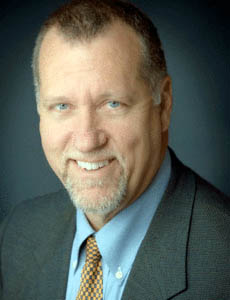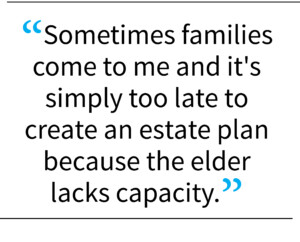Your Estate . . . with James Ward: Small strokes can be warning signs, get your estate planning in order
Picking someone you trust is usually a much better option than having the court pick a stranger to be in charge of your money and your body
By James Ward

James Ward
Have you planned ahead? Do you know when you’ll have a stroke?
Some people define a stroke as a sudden, unplanned event. You don’t know when it’ll happen, but sometimes I see families who tell me that Dad had two small strokes, and they thought he was getting better, but then he had a major stroke and now he’s incapacitated.
What were they waiting for? The small strokes were warning signs.
I recently read this from a nationally recognized elder law attorney regarding planning to avoid a conservatorship imposed by the court: “The older person faces a difficult dilemma. He or she may never need assistance in managing his or her financial affairs, but if that person waits until it is clear that such assistance is needed, it may then be too late. The older person might, at that point, lack sufficient mental capacity to execute an arrangement that would make the conservatorship unnecessary. In a very real sense, therefore, the older person must create whatever alternative that he or she prefers before that person really needs it.”
Yes, exactly! That’s it!
And I spend a lot of time trying to explain this to people. You can’t put air in the spare tire after you get the flat tire out on the deserted highway, you can’t put the toothpaste back in the tube, and you can’t get your estate plan in order after you lose mental capacity. And, if you have young children, you can’t name the guardians after you and your spouse both die. These things require advance planning.
Think about it. It’s called estate planning. There’s a reason why we call it that. We don’t refer to it as estate improvising.
 As Benjamin Franklin said, “Failing to plan is planning to fail.” To get it done right, you have to plan in advance. This is not something that just happens magically to protect the people left behind after your death. Yes, you actually have to make a plan before you need it.
As Benjamin Franklin said, “Failing to plan is planning to fail.” To get it done right, you have to plan in advance. This is not something that just happens magically to protect the people left behind after your death. Yes, you actually have to make a plan before you need it.
We do have cases where people make changes just hours or days before they pass on, but those are the lucky ones who got it done just in the nick of time. That’s unusual. If you care about yourself and your loved ones, plan ahead. Please.
And for the unmarried people with no caring friend, partner, or children, who will pick you up off the floor and make sure that your money and other assets are used for your benefit? Who do you trust and authorize to spend your assets for your care? Picking someone you trust is usually a much better option than having the court pick a stranger to be in charge of your money and your body. It’s too often that we see the court appointed person justifying the liquidation of your assets so that your estate has the funds to pay that same person to make the decisions for you.
Sometimes families come to me and it’s simply too late to create an estate plan because the elder lacks capacity. Sometimes they come with an existing estate plan, but it wasn’t done properly and now they have major problems. An excellent plan is within your reach if you decide to get it done while it’s still possible.
 I recently had a widow come to me and she explained that they wanted to come to me earlier, but then her husband’s health went downhill quickly. They saw that it was more and more urgent to get their affairs in order, but her husband died before they called me, and then the widow was left with a horrific mess.
I recently had a widow come to me and she explained that they wanted to come to me earlier, but then her husband’s health went downhill quickly. They saw that it was more and more urgent to get their affairs in order, but her husband died before they called me, and then the widow was left with a horrific mess.
I’ve never had a stroke, and I can assure you that I’ve never died, so I can’t pretend to know what it’s like. But do you want to leave your spouse and family with a huge mess?
Do you want to leave your family with a court-appointed person in charge of everything? Plan ahead. Act now.

